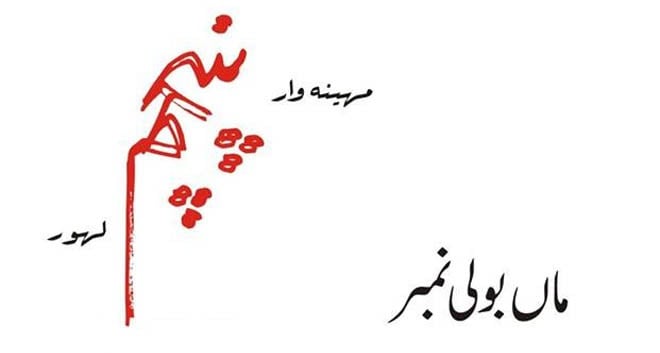
The current issue of ‘Pancham’ is dedicated to the significance and essentialness of being educated in one’s own mother tongue

The latest edition of the monthly or bimonthly ‘Mahwaar Pancham’ is a reprint of a 2004 issue dedicated to the very important and unresolved issue of Maa Boli, the mother tongue, which assumes tragic poignancy when referring to the Punjab. Punjabis constitute a major chunk of the population of Pakistan, and yet it is in the province of Punjab that the reluctance to write and teach their own mother tongue resides in all its majesty.
The second edition of the issue, which was first printed 12 years ago, discusses the total lack of movement where the Punjabi language is concerned. Twelve years later, the same issues and hurdles appear to be holding Punjabi back and preventing the mother tongue from becoming the core of academic and intellectual discourse. Unfortunately, in the absence of these discourses, Punjabi has only been relegated to be used in everyday conversation, for banter in the street and issuing instructions to the house help. Remaining conversations or dialogues are conducted in other languages, mainly Urdu and English.
Usually, it is the case of minority communities that feel discriminated against, and complain about being denied the basic fundamental rights of speaking, writing and being educated in their own mother tongue. But what should be done if a majority community is denying itself its own fundamental right of being able to own its mother tongue, Punjabi?
Punjabis have been held hostage by their own history and they are unclear about the cultural direction they should be taking. They have been too enamoured by the sheen of globalisation, and view themselves as active and useful partners in the emerging mesh of global cultures. That they can play a decisive part in this global culture is fortified by their perception of their past success. They quit using their language, the mother tongue, and switched to Urdu and English and have not expressed regret at losing out. At least culturally they do not think they have lost out.
Actually, the common perception is that they have gained a lot. Being a malleable community has helped them rise in Pakistan and their familiarity with the English language has made sure that they are not left out of the international arena. They find themselves at home in various capitals of the world.
It is thus a little difficult to explain to them what they might have lost in the process, or what they have failed to achieve or that they could have achieved a lot more if they had taken the stated route of learning through their mother tongue and then, by degrees, acquiring knowledge in other languages.
But there are many Punjabis who do contest the design of this so-called success model and do issue calls to rectify it to its proper alignment.
The current issue of ‘Mahwaar Pancham’ is dedicated to the significance and essentialness of being educated in one’s own mother tongue because it is here that the real treasure trove of cultural inheritance lies. Culture is not something that can be worn and shed upon desire, but it is an organic part of one’s own being as a community. It may lead to alienation and a dichotomy that needs to address itself first, rather than address the rest of the issues of the country and the world.
Some of the most strident scholars, poets and writers who have owned Punjabi, almost as an article of faith, are represented in this issue of ‘Mahawaar Pancham’. They could have made a name for themselves, could have garnered a much larger readership and a status recognised around the world, but still chose to write in their own language. They made Punjabi their medium of expression as well as the platform for advocating why it was absolutely crucial to be doing so.
These writers or intellectuals are well-known. It was thought that all their important writings on the issue needed to be put in one place so as to hammer home the importance of the issue and its significance. These intellectuals, poets and writers have struggled all their life to promote this just cause, and yet it has been a losing battle because mainstream Punjabis are still not convinced. Even if they are convinced, they are not moved because they find more value in pragmatism and feel the need to be part of the mainstream.
Some texts may have been written specifically for this number but many of the pieces in the edition are of works that were published earlier. Some texts have been translated into Punjabi from other languages, mostly English.
Who does not know Najm Hosain Syed and Asif Khan, two crusaders who have fought many battles with their armoury of critique? There is also Abid Umeeq and Nadir Ali who have spoken unequivocally about the issue. They have been joined by the likes of Eric Cyprian, Hussain Naqi, Sibtul Hasan Zaigham and by the late Tariq Rehman, who have all taken up cudgels for the cause and have been writing on the languages written and spoken by the people here -- Urdu, English and above all Punjabi.